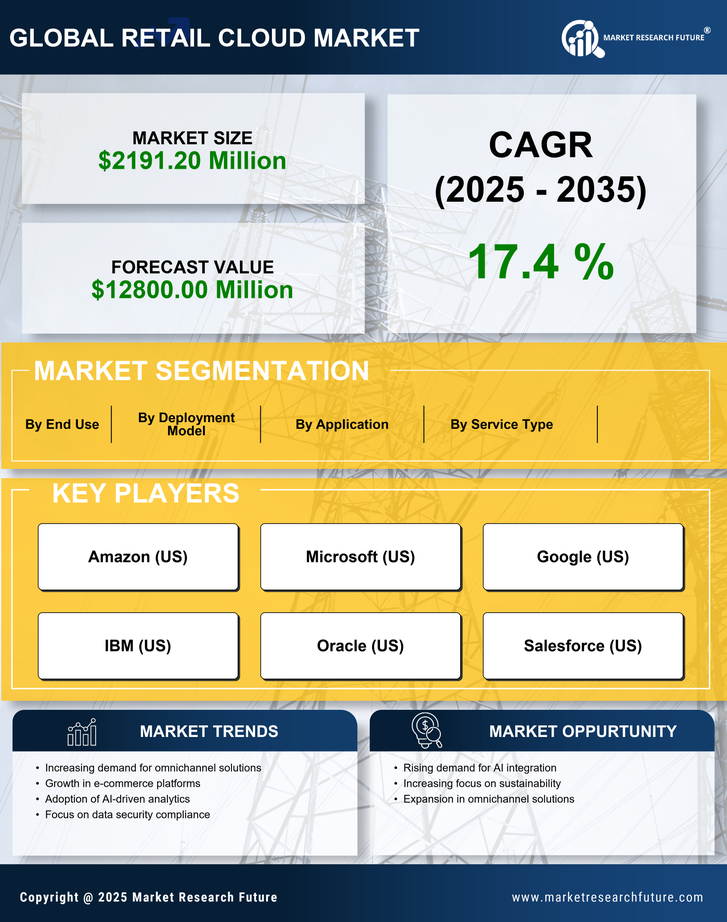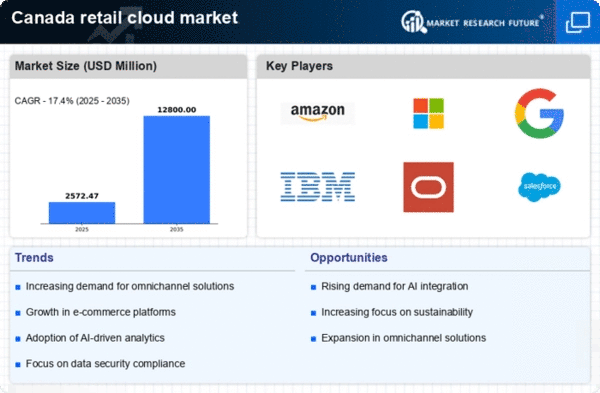Expansion of Digital Payment Solutions
The retail cloud market in Canada is experiencing a notable shift due to the expansion of digital payment solutions. As consumers increasingly prefer cashless transactions, retailers are compelled to adopt cloud-based payment systems that facilitate seamless transactions. This trend is underscored by a report indicating that over 60% of Canadians now utilize digital wallets for their purchases. The integration of these solutions into the retail cloud market not only enhances customer experience but also streamlines operations for retailers. Furthermore, the ability to analyze transaction data in real-time allows businesses to make informed decisions, thereby driving growth in the retail cloud market. As digital payment technologies continue to evolve, their impact on the retail cloud market is likely to intensify, fostering innovation and competition among service providers.
Rise of Customer-Centric Retail Strategies
In the retail cloud market, the rise of customer-centric retail strategies is becoming increasingly prominent. Retailers are leveraging cloud technologies to gather and analyze customer data, enabling them to tailor their offerings to meet specific consumer preferences. This shift is reflected in a survey revealing that 75% of Canadian consumers are more likely to shop with brands that provide personalized experiences. By utilizing cloud-based analytics, retailers can enhance customer engagement and loyalty, which are critical for sustaining competitive advantage. The retail cloud market is thus evolving to support these strategies, providing tools that facilitate targeted marketing and improved customer service. As businesses continue to prioritize customer satisfaction, the demand for cloud solutions that enable these strategies is expected to grow, further propelling the retail cloud market.
Integration of Supply Chain Management Solutions
The integration of supply chain management solutions within the retail cloud market is a key driver of growth in Canada. Retailers are increasingly adopting cloud-based systems to enhance visibility and efficiency across their supply chains. This trend is evidenced by a report indicating that 70% of Canadian retailers are investing in cloud technologies to optimize their supply chain operations. By utilizing these solutions, businesses can better manage inventory, reduce costs, and improve delivery times. The retail cloud market is thus positioned to support these advancements, offering tools that facilitate real-time tracking and data sharing among supply chain partners. As the demand for efficient supply chain management continues to rise, the retail cloud market is likely to see sustained growth, driven by the need for enhanced operational capabilities.
Emphasis on Sustainability and Eco-Friendly Practices
The retail cloud market is increasingly influenced by the emphasis on sustainability and eco-friendly practices among Canadian consumers. Retailers are recognizing the importance of adopting cloud solutions that not only enhance operational efficiency but also reduce their environmental footprint. A recent study indicates that 65% of Canadians prefer to shop with brands that demonstrate a commitment to sustainability. This consumer preference is prompting retailers to invest in cloud technologies that support sustainable practices, such as energy-efficient data centers and reduced paper usage. Consequently, the retail cloud market is evolving to accommodate these demands, providing solutions that align with eco-friendly initiatives. As sustainability becomes a core value for consumers, the retail cloud market is likely to experience growth driven by the integration of environmentally responsible practices.
Advancements in Data Analytics and Business Intelligence
Advancements in data analytics and business intelligence are significantly shaping the retail cloud market in Canada. Retailers are increasingly utilizing cloud-based analytics tools to gain insights into consumer behavior and market trends. This trend is supported by data showing that 80% of Canadian retailers are prioritizing data-driven decision-making to enhance their competitive edge. By leveraging these analytics capabilities, businesses can optimize their inventory management, marketing strategies, and customer engagement efforts. The retail cloud market is thus positioned to provide the necessary infrastructure for these analytics solutions, enabling retailers to harness the power of data effectively. As the demand for actionable insights continues to grow, the retail cloud market is expected to expand, driven by the need for sophisticated analytics tools.

















